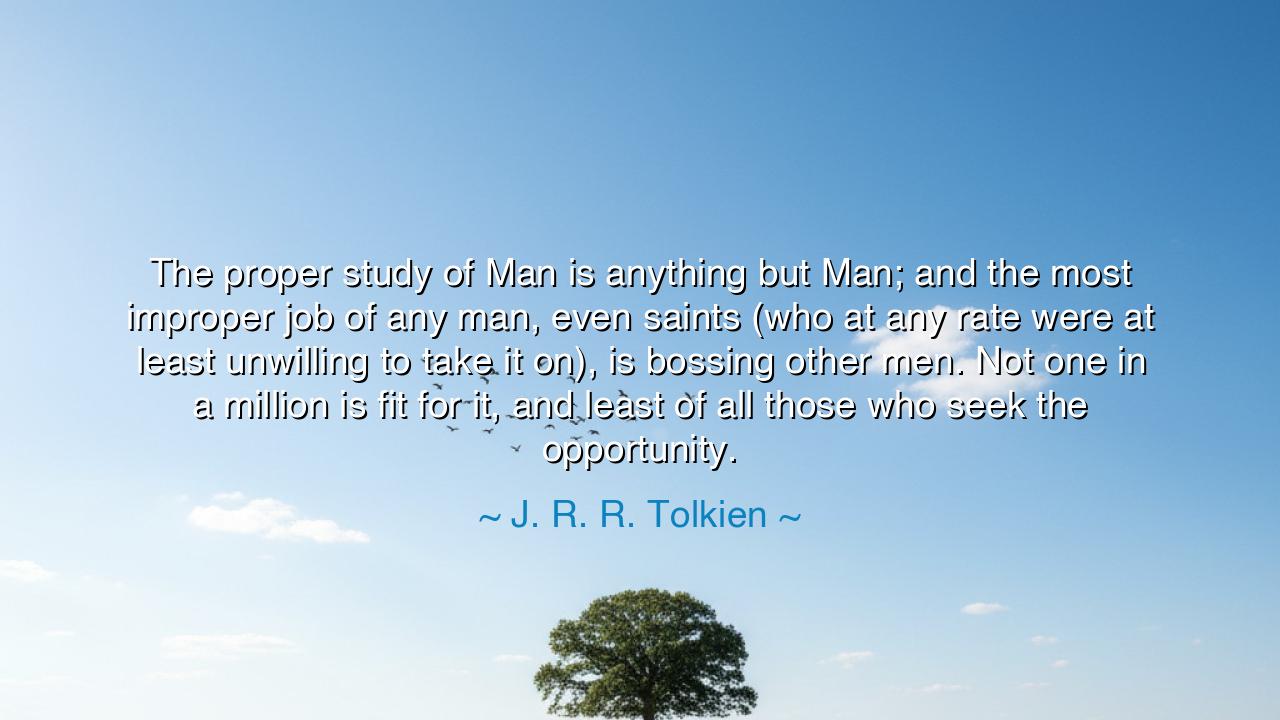
The proper study of Man is anything but Man; and the most
The proper study of Man is anything but Man; and the most improper job of any man, even saints (who at any rate were at least unwilling to take it on), is bossing other men. Not one in a million is fit for it, and least of all those who seek the opportunity.






"The proper study of Man is anything but Man; and the most improper job of any man, even saints (who at any rate were at least unwilling to take it on), is bossing other men. Not one in a million is fit for it, and least of all those who seek the opportunity." These words, spoken by the wise and profound J.R.R. Tolkien, challenge us to reconsider our understanding of leadership and power. Tolkien, a master of myth and legend, offers a truth that transcends time: the study of human nature, in its most honest form, is not about ruling others or seeking dominion over the lives of men. True understanding lies in examining the world, the forces that shape us, and the moral compass that guides us—not in striving for positions that require us to dominate, control, or “boss” others.
From the dawn of civilization, the quest for power has shaped the trajectory of human history. Ancient kings and emperors, like Alexander the Great and Julius Caesar, sought to extend their empires and influence, often through the exertion of control over their subjects. Their names live on in history as icons of strength and ambition, yet in many ways, their power came at a great cost—the cost of human lives, of cultures lost, and of moral decay. Alexander, in his desire to conquer the known world, became both a hero and a tyrant, loved by some, feared by others, and yet, in the end, his empire crumbled after his untimely death. The thirst for power, as Tolkien suggests, can be both corrupting and unrelenting, often leading those who seek it to destroy not just others but their own integrity.
Tolkien’s wisdom is rooted in the ancient understanding of leadership, one that warns of the dangers of those who seek to lead. King Solomon, the wise and just ruler of ancient Israel, was often regarded as the epitome of wise leadership, and yet, even he knew the burden that power brings. In his writings, particularly in Ecclesiastes, he speaks of the vanity of human ambition and the futility of chasing after power for its own sake. Solomon, who was granted wisdom from God, understood that true leadership comes not from dominating others, but from humility, wisdom, and a deep sense of responsibility. Those who are truly worthy of leadership are those who do not seek it out but are chosen by circumstances and tested by their own virtues. It is a burden, not a privilege, and the wise ruler is he who rules with justice, not through arrogance.
In contrast, the desire to dominate or control others often leads to tyranny and corruption. Consider the story of Napoleon Bonaparte, whose rise to power was marked by brilliant military strategy and ambition. Yet, in his desire to rule Europe, Napoleon became a tyrant whose hubris led to his downfall. Like so many who have sought power before him, Napoleon's eventual failure was not just in his military campaigns, but in his inability to see the dangers of unchecked power. Tolkien’s warning resonates deeply in this context—the seeking of power can often cloud one’s vision, leading a leader to act not in the interest of others, but for their own selfish gain. Napoleon, like many before and after him, became a victim of his own desires, losing sight of the true purpose of leadership.
Tolkien’s cautionary words are especially powerful because they point to the human condition—the temptation to rise above others, to become the master of one’s destiny by mastering others. Yet, the greatest leaders in history, the ones who have left the most enduring legacies, were not those who sought control but those who understood the responsibility that came with leadership. Think of Nelson Mandela, who emerged as a leader not because he sought power, but because he was called to serve his people in their most desperate hour. Mandela’s leadership was built on the foundation of justice, compassion, and equality. His power came not from ruling others, but from bringing people together, from showing them that true strength lies in unity and respect, not in domination.
The lesson Tolkien offers us is profound: true wisdom does not lie in ruling or dominating others, but in understanding that the study of man is not about control. It is about understanding, empathy, and the ability to lead with humility. We must recognize that leadership is a sacred duty, not a privilege. It requires sacrifice, selflessness, and a commitment to the well-being of those we serve, rather than our own ego. Those who seek leadership for personal gain or out of a sense of self-importance are often the least qualified to lead, for they are blinded by the very desires that should be kept in check.
In your own life, take this wisdom to heart. Whether in your career, your family, or your community, remember that true leadership is not about asserting dominance, but about serving others. Seek not to control or manipulate, but to understand and guide with integrity. Be the one who listens, the one who acts with compassion, and the one who inspires others to be their best selves. Like the great leaders of history, your true strength will not lie in how many people bow before you, but in how many you uplift and inspire. The study of man is not about mastering others, but about mastering yourself, and in that self-mastery, you will become the kind of leader the world truly needs.






AAdministratorAdministrator
Welcome, honored guests. Please leave a comment, we will respond soon